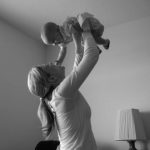 Guest Blog written by Kelley Abrams, Ph.D.
Guest Blog written by Kelley Abrams, Ph.D.
Over the first few months of life, babies form a close, special relationship with one or a few selected caregivers. This special relationship is called attachment. The attachment relationship evolved through natural selection to keep infants safe from harm. Babies use their attachment figures as a secure base from which to explore and learn about the world. This first attachment relationship serves as a model for all future social relationships and can have profound effects on a child’s developing sense of self and social-emotional competence.
Babies are born “wired” for connection and relationships. They prefer human stimuli— face, touch, voice, and smell over everything else. How very young children are cared for teaches them how to interact with the world and greatly influences who they will become. Despite our best intentions, however, not all parents are able to accurately, appropriately, and sensitively respond to their infant’s cues, behaviors, and emotions. For some parents, difficult childhood experiences of their own may shape the way they respond to their own babies—misreading cues and behavior and tending to either over or under respond. For other parents, current life stressors (such as trauma, poverty, depression) present obstacles to responding sensitively to their infants. Babies and children require emotionally connected –trusted—and caring adults in their lives in order to grow, develop and thrive. Our communities and systems can and should help support parents. Parents under stress cannot optimally connect and support their children’s emotional development.
Over time through their first relationships and experiences with caregivers, babies develop a sense of themselves in relationships with others. For those who have been responded to sensitively, they develop a secure, confident sense of self. Feelings of insecurity in relationships can develop when babies experience inconsistent, disrupted, interfering, and/ or rejecting care. These trusting relationships foster the social and emotional skills necessary for school readiness—confidence, persistence, self-regulation, problem-solving, attentiveness, and ability to form relationships—that lay the foundation for lifelong learning, productivity, and emotional well-being.
It takes time and consistency with a responsive caregiver for babies to develop this sense of security in relationships. In fact, it is not until 6 or 7 months that the attachment relationship is fully formed with babies crying and reaching for, clinging to, and approaching trusted caregivers and not other adults. When parents don’t have the time to care for their infants because of demands to return to work and infants don’t have consistent care because of inadequate or rotating childcare staffing, the consequences can be severe and long-lasting.
As a child development and parenting consultant, many of the families that I work with come to me because their 2, 3, and 4 year olds are having problems socially and in preschool—feeling worried and anxious, shy and timid, or being overly aggressive and disruptive. In short, problems are arising with their emotional-regulation capacities. Nationally we know that around 12% of 2 and 3 year olds experience social and emotional difficulties that hinder their functioning at home and in school (Zero To Three). Parents and children need more time together. Children seek out their primary caregivers when they feel worried or ill. If parents are unable to be with their children during these times, then the children’s stress increases-furthering risk to their physical and emotional health.
The pillars of the For Our Babies campaign of paid leave for parents for the first 9 months of their child’s life and quality infant/toddler care along with better and more comprehensive prenatal and well baby care are crucial policy needs to support parents and children. Without these community and national systems of care, cycles of stress and emotional incompetence will be perpetuated across generations leaving all our families more vulnerable.
Kelley Abrams, Ph.D. is a Developmental Psychologist and Graduate Fellow with Zero to Three. She works as a consultant to families, schools, and organizations to support the healthy social and emotional development of all children. More information about her services, workshops, publications, and trainings can be found at www.kelleyabrams.com.







It is critical that we all get the word out in many ways. In our community I have been doing a few things : Baby and Wee classes,community discussions, attending different conferences,hosting community conferences,staff development I have also created a parent blog.
This conversation is not happening in the under served communities and we are trying to expand it to that community.
Thank you for everything you do on behalf of babies and also for helping to expand the conversation about babies and families in more communities!